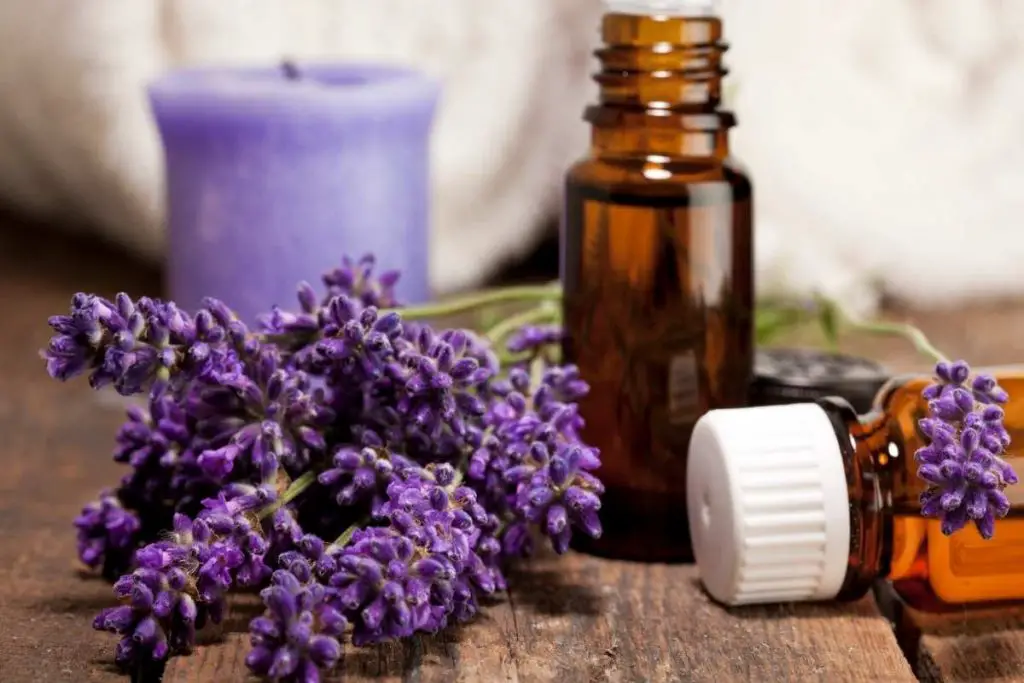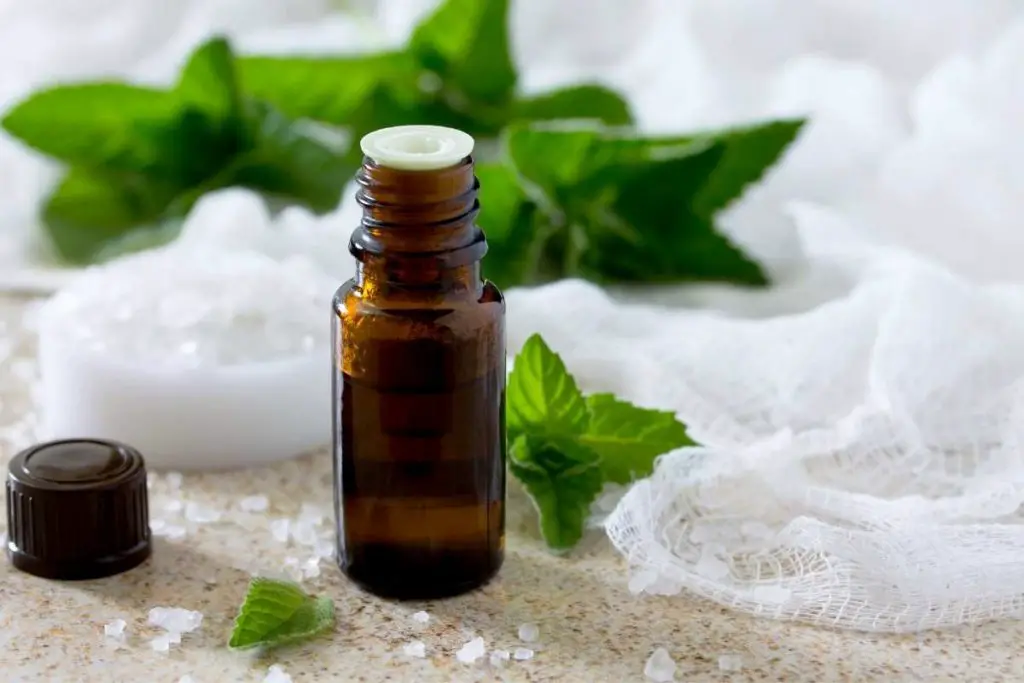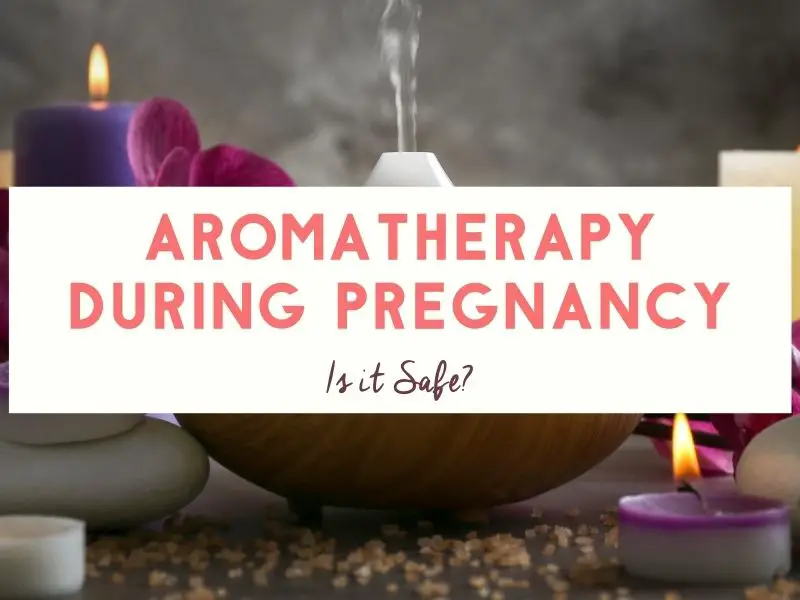Whether you’re planning a visit to your favorite spa that uses essential oils, looking for homeopathic pregnancy symptom relief, or you just love your diffuser, aromatherapy is likely one of those things that you want to know more about before you jump in baby-bump first. After all, essential oils have been quite controversial over the past few years thanks to certain MLM companies.
So, are essential oils safe during pregnancy when used for aromatherapy? Yes! Not only can many essential oils be used safely when pregnant but they can also help improve physical and emotional well-being during pregnancy. However, just as you need to make minor adjustments to your diet and lifestyle to protect the health of you and your baby, you’ll also need to make minor changes to the way you choose and use essential oils to work with them safely.
What Essential Oils to Choose (And What Ones to Avoid)
There are high-risk essential oils for a pregnant woman, these being oils high in phenols, aromatic aldehydes and ethers. To minimize the risk, rather than avoiding aromatherapy altogether, the pregnant mother can simply avoid high-risk oils, such as sweet fennel (Foeniculum vulgare) and the thymol chemotype of thyme (Thymus vulgaris ct thymol). The International Federation of Professional Aromatherapists (IFPA) concisely details essential oils which are considered safe and unsafe during pregnancy (https://ifparoma.org/wp-content/uploads/2020/03/Pregnancy-guidelines-1.pdf). As with aromatherapy use out with pregnancy, each “safe” oil must still be assessed for its suitability alongside any existing medical issues.
Those who argue that aromatherapy isn’t safe during pregnancy often refer to essential oils with an emmenagogue (menstruation stimulating) activity, fearing that such oils pose a risk of triggering unwanted uterine contractions. It is worth noting that there is no evidence to demonstrate that any emmenagogic essential oils commonly used in aromatherapy can stimulate the contraction of uterine cells (file:///home/chronos/u-cddd04d5c8371ebea6a085f33a61462fe365087f/MyFiles/Downloads/ijms-22-02380%20(2).pdf).
Another commonly mooted concern involves the natural variation in an essential oil’s chemical make-up which can arise. This is a valid point since some “chemotypes” (chemical variations) of an oil, as illustrated by thyme essential oil, can be unsuitable for use during pregnancy. The importance of chemical consistency within an oil is well understood by the essential oil industry, hence the chemical analysis of oils is standard practice. A good essential oil supplier will therefore be able to provide you with data regarding the chemical make-up of each batch of their essential oil and inform you as to whether an essential oil is considered standard or a chemotype.
Another valid concern is that essential oil ingredients will cross the placenta and potentially harm the developing fetus. Essential oil components do in fact cross the placenta, hence the need to avoid the high phenol, aromatic aldehyde, and ether-containing essential oils since these potent ingredients, at high levels, could pose a risk to fetal development. But when other safe essential oils are used normally (not at abnormally high or frequent doses) via inhalation or once a day topically at a 1% dilution, there is no evidence the ingredients do cross the placenta have any negative impact on the fetus.
Therefore, there is a lack of evidence suggesting that the normal use of most common essential oils is dangerous when used during a healthy pregnancy. Instead, what we do see is a growing body of evidence in relation to the safe and beneficial use of essentials oils throughout pregnancy.
Appropriate essential oil choices have been shown to safely offer the pregnant mom both physical and emotional health benefits at various stages of her pregnancy. In fact, it is aromatherapy’s ability to address both the physical and emotional health of the mom which makes it so helpful.
Stress is considered problematic during pregnancy.
Stress is associated with depression in the mother, pre-term deliveries, and low birth weights. Furthermore, some pregnant women report worsening fatigue and morning sickness when they’re feeling stressed and anxious.
Research published in the Journal of Complementary and Alternative Medicine (https://www.ncbi.nlm.nih.gov/pmc/articles/PMC3804257), detailed the work of Dr Toshiko Igarashi who sought to observe the impact of essential oils high in the anxiety-reducing constituents linalool and linalyl acetate on pregnant mothers. The group of mothers who inhaled such essential oils during the trial were found to report a decrease in feelings of tension and anxiety and they demonstrated increased parasympathetic nerve activity (the parasympathetic nervous system being the section that dominates when we’re relaxed). This mirrors the results of other aromatherapy studies where pregnant women’s cortisol (a key stress hormone) levels dropped following inhalation of essential oils.

Lavender Essential Oil During Pregnancy
Lavender (Lavandula angustifolia), one of our most popular essential oils, is a perfect of example of an oil high in linalool and linalyl acetate and yet, due to its reported emmenagogic activity, it is sometimes cited as an unsafe essential oil for use during pregnancy. Research published in The Mental Health Clinician (https://www.ncbi.nlm.nih.gov/pmc/articles/PMC6007527) supports lavender essential oil’s ability to reduce feelings of anxiety and to improve sleep, which will naturally be of benefit during pregnancy in terms of addressing stress levels. This study did not indicate any safety issues associated with the use of lavender essential oil as an inhaled remedy.
Further essential oils which are associated with a calming and stress-reducing effect, considered safe to use during pregnancy as per the IFPA guidelines, include bergamot, clary sage, frankincense, mandarin, neroli, petitgrain, Roman chamomile, rose, sandalwood, sweet marjoram and ylang ylang. These essential oils can be inhaled in order to evoke their stress-relieving effects or they can be used under the guidance of a qualified aromatherapist in topical applications such as massage and bath oils, used at a dilution of less than 1%.
In addition to offering a pleasant way to manage stress levels, essential oils can be utilized in pregnancy to reduce other troublesome symptoms. The first symptoms most pregnant woman experience is nausea and morning sickness. For some, morning sickness can become debilitating, limiting the woman’s ability to work or care for dependents (or even herself).

Peppermint Essential Oil
Several clinical trials have been conducted into the use of peppermint essential oil as a potential management strategy for morning sickness. As was demonstrated well in the study published in the Journal of Family Medicine and Primary Care (https://www.jfmpc.com/article.asp?issn=2249-4863;year=2019;volume=8;issue=8;spage=2597;epage=2601;aulast=Amzajerdi), the use of peppermint essential oil can reduce the severity of nausea and vomiting in women who inhale it. There have been other similar trials and although in some cases the peppermint essential oil group and the placebo group ended the trial period at a similar level in terms of the continued presence of their morning sickness, the women using the essential oil experienced less severe unpleasant symptoms throughout the trial compared to the placebo group.
Some agencies include peppermint within their “unsafe” list of essential oils for use during pregnancy and for women who therefore do not wish to use it, there are other options. A trial reported in the Iranian Red Crescent Medical Journal supported the safe use of lemon essential oil (when inhaled) to reduce the symptoms associated with morning sickness (https://www.ncbi.nlm.nih.gov/pmc/articles/PMC4005434/). Lavender essential oil has also been researched for this purpose, with good results, offering up a further option for women who wish to avoid peppermint.
Aromatherapy Use During Labour / Birth
There is also evidence supporting the use of aromatherapy during labor, to help reduce anxiety and pain. Such is the confidence in the safe use of a range of essential oils during labor, we now see hospitals across the world utilizing them during deliveries. From the US and Canada to the UK, Europe, and Australia, women are now being offered the inclusion of essential oils during their birthing experience.
Research suggests that essential oils offer an effective, natural strategy for reducing the need for pharmaceutical pain interventions. A recent article published in the Journal of Obstetrics and Gynaecology (https://pubmed.ncbi.nlm.nih.gov/32666866/) illustrated the ability of aromatherapy to decrease pain during the early and late stages of labor. Among the labor-based trials, lavender and rose essential oils were a popular and effective choice, acting to both reduce pain and anxiety.
Other trials on the same matter postulate that in addition to the inhalation of the chosen essential oils, massage, aromatherapy baths, and other topical applications may also be useful during labor.
When we review the research on the safe and effective use of essential oils during pregnancy, it is predominantly at this final stage of the pregnancy journey that we see a move away from inhalation to topical applications. Though aromatherapists commonly use low dilutions of essential oils for pregnancy massages throughout much of pregnancy, mothers concerned about the safety of aromatherapy may feel happiest following the approaches supported by clinical trials, thereby opting to use inhalations alone up to the point of labor.

